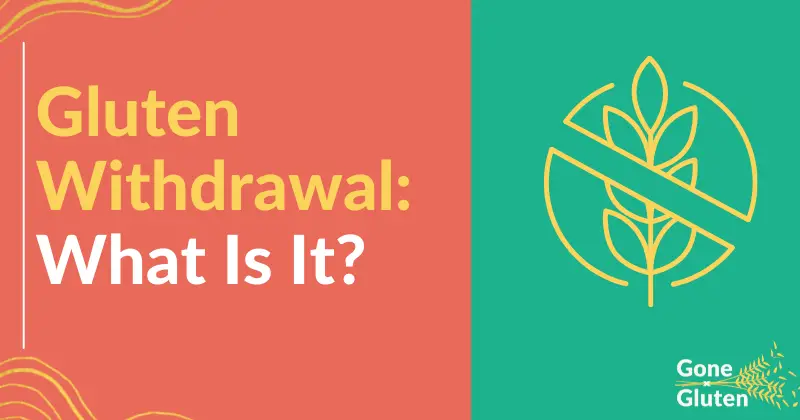Most of us have tried giving up something in our lives that we’ve determined doesn’t serve us well. Some choose to give up smoking, drinking alcohol, or screen time. Others eliminate certain foods from their diets, whether for ethical, health, or other personal reasons.
No matter the vice that someone gives up, withdrawal often results. When I first removed gluten from my diet I was very curious about gluten withdrawal; what is it?
It is an adverse reaction when an individual removes gluten from their diet. This appears as increased hunger, nausea, and exhaustion.
However, some researchers, including internal medicine and obesity physician at Johns Hopkins Medicine, contend that there’s no scientific evidence to suggest that these symptoms are attributable to patients going gluten-free.

Why Do People Remove Gluten From Their Diets?
Gluten is a protein naturally found in grains, such as wheat, rye, barley, and malt. It’s also commonly added to processed foods for added texture.
While many people can consume products containing this protein without experiencing any repercussions, that’s not the case for those suffering from inflammatory bowel diseases, like Crohn’s or ulcerative colitis (UC), or celiac disease.
The symptoms someone with celiac disease endures compared to IBS can differ. Those with UC or Crohn’s may experience:
- Stomach discomfort or bloating
- Constipation or diarrhea
- Anxiety or depression
- Fatigue
- Clouded thoughts
- Headaches
These are similar symptoms to what someone suffering from celiac disease or a wheat allergy would experience with a few additions such as:
- An iron deficiency
- Arm or leg numbness
- Nasal congestion
- Skin conditions (i.e., blistering, rash, hair loss or psoriasis)
- Muscle and joint pain
- Unexplained weight loss
The presence of these symptoms may motivate someone suffering from them to begin eliminating gluten from their diets to improve their health.
What May Happen When You Remove Gluten From Your Diet?

Individuals report feeling a variety of symptoms when they remove gluten from their diets, including:
- Extreme hunger
- Dizziness or brain fog
- An itchy rash
- Increased depression or anxiety
- Nausea
- Fatigue
Medical research shows that most of these reactions subside within a week or two after eliminating gluten from your diet. However, some adverse reactions may take longer than a to dissipate, such as skin conditions and insense hunger.
Check out what the List has to say about going GF.
Why Do I Feel Like I’m Starving After Going Gluten-Free?
Researchers have been trying to figure this out since at least 1978 when the National Institute of Mental Health (NIMH) commissioned a study on the effects of abrupt removal of gluten from lab rats’ diets.
The researchers highlighted their findings in an article entitled “Opioid Peptides Derived from Food Proteins,” published in The Journal of Biological Chemistry.
The researchers found similarities between the withdrawal symptoms that their lab rats and heroin addicts experienced. In the latter case, they experience withdrawal symptoms, including nausea, extreme hunger, depression, anxiety, dizziness, and anxiety.
Medical researchers have routinely cited the NIHM-commissioned study when explaining how individuals with damaged gastrointestinal tracts may experience a release of gluten-rich peptides, known as gliadorphins, into their bloodstreams. These bind with the brain’s opioid receptors, creating a withdrawal response.
How Can You Stop Gluten Withdrawal?
Diarrhea and bloating are perhaps the most common side effects individuals experience when eliminating gluten from their diets. There are several different ways you can stop or reduce these symptoms.
1. Eliminate Alcohol, Caffeine, and Sugar From Your Diet

Consuming these requires your digestive system to work hard. Temporarily removing these consumables from your diet (including carbs that turn into sugar) will give your digestive system a much-needed break while it’s trying to adjust to the removal of gluten from your diet.
2. Consume More Wholefoods

Processed foods are likely to have hidden sources of gluten in them and tend to be hard for your digestive system to process. Fresh fruits and vegetables, lean proteins, nuts, and grains are more easily digestible, which will put less pressure on your already vulnerable digestive system.
3. Temporarily Eliminate Dairy From Your Diet
Dairy is another food product that is hard for your digestive system to process. You may want to reintroduce dairy into your diet, provided you don’t also discover that you’re lactose intolerant now that you’ve removed gluten from your diet.
4. Take The Propper Supplements

Probiotics help grow the good bacteria in your gut. You can ingest these by consuming food high in probiotics like kimchi or kombucha. Buying these in supplements format is also a great option. Enzyme-rich supplements or vitamins should also be added to your list as they help your body break down the food you consume making it easier for absorption.
Both can create more stability in your gastrointestinal tract. Adults don’t generally get enough magnesium in their diets. This deficiency can result in muscle cramps when you’re withdrawing from gluten-rich grains.
5. Increase Your Water Intake

Removing gluten products from your diet can cause a drop in insulin levels, resulting in muscle cramps, nausea, and dizziness. Increasing your hydration levels during the earliest days after removing gluten from your diet will help you minimize these side effects.
6. Increase Your Consumption Of Sodium And Iodine

As processed food are high in sodium, eliminating these from your diet will result in a drop in your salt intake. Sodium is critical to reducing cramping and cloudy thoughts that come with a drop in insulin level and dehydration.
Intentionally supplementing your diet with sodium and iodine should alleviate some of your gluten withdrawal symptoms.
If your withdrawal symptoms don’t subside within a week or two, then you might not have entirely eliminated all gluten-containing foods from your diet. You may also find that cross-contamination has occurred.
Conclusion
If you have to take on the GF diet, don’t panic. You now know how to manage your gluten withdrawal symptoms and methods to avoid them from occurring.
You should always consult with a registered dietitian or a physician before making any dietary changes if side effects persist. You may discover that you have additional allergies by doing so.
For more tips on managing your gluten-free diet check out Gone Gluten!



